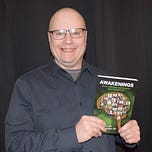
Anyone who has a mental illness can look back and see some of the mistakes they have made. I have had deep regret over so many things that happened just after I was first diagnosed. I found 12-step groups helpful, especially the literature that went with the meetings. One of the things you are encouraged to do is to make an inventory of all the good and bad in your life, and to set all your accounts straight. Unfortunately, I went to one group and met one of the worst possible people I had ever known and let him convince me that we were close friends. In the end, he lied, cheated, stole, and abused me both physically and mentally. Later, determined to build a better life from the ground up, I returned to the meetings but didn’t get too close to anyone and worked hard at fixing the problems in my life. This became the solution I needed.
One of the things I recall liking about the 12-step meetings was practicing my speaking skills. Everyone would get a chance to speak at most meetings, and I started to really like trying to inspire or entertain others. Unfortunately, this experience was a dead-end street. It got me away from my substance use, but it wasn’t like attending university or finishing an apprenticeship. No better job awaited for me, no real progress, other than what I had done working on the 12 steps occurred, and of course, it did absolutely nothing for my mental illness. Still, I don’t regret the time I spent and there were people who were positive influences in my life and still are to this day.
One of the reasons I often tell people with mental health concerns to keep a journal is that you can write out and think out times in your life you made mistakes, and if they still bother you. Writing out and thinking out things like this allow you to not only process feelings you may never be able to resolve, but also to keep track of things that occupy your mind, giving yourself the ability to resolve them.
One of the things I think needs to be done with young people, even at age 12, is for them to begin to understand what mental illness is and how to recognize the signs of when a person should ask for help. If you have a child of this age at home, you may want to go over your family history with them and not only identify which genetic illnesses this child could be prone to, but to explain a few things, especially the dangers of recreational drugs and alcohol. If you have a genetic predisposition of psychosis in your family, adolescent chronic marijuana use can greatly increase the chances of a serious mental disorder.
When I look back at my teen years, I went on a date with a young woman who seemed really nice and liked me. To me of course, even though I had nearly zero relationship experience, she just wasn’t up to my standards. I ended up introducing her to a friend of mine and then later learning she was actually a teen prostitute. That night, I got in my car and drove into a loading dock because it was the only place I could find where I could be alone with my thoughts. One of the things I was thinking about was, even though I didn’t fully understand the meaning of it at the time was that I was terribly unhappy and that I had some illness that I put the name manic depression to.
This was a devastating thing to experience but I wouldn’t be alone forever. I did end up living on the West Coast and going on all kinds of dates and getting all kinds of phone numbers from women, but because I had never learned much about communication or decency or respect for people, most of these relationships were very short-lived. It wasn’t until I was much older and took a life skills class, a wellness class, and a Wellness Recovery Action Plan or WRAP course that I came to understand the importance of not only communicating with people, but communicating with the right people (psychiatrist, therapist, nurse, family member, friend, intimate partner). After getting more knowledge of myself not just though speaking with these people, but in communicating my own thoughts and feelings on the written page, I began to see real progress in my life.
The one mistake I kept making regarding my illness? Not having someone to advocate for me, and not understanding the importance of having an advocate. Fortunately later in the progression and remission of my illness, I had a social worker at a clinic and they did so much to help me with my self esteem, and met me at my level, as a friend, not just a clinical contact.
Now, I have gone through just about all of the common stages of mental illness. I have had my prodromal phase, where I didn’t have psychosis, but did have crippling depression. I have had my psychotic breaks, periods of psychosis, recovery, times of medications, times going off them and getting sick again, and now gone fully into remission with my symptoms. Throughout all of this, communication is the one thing that keeps surfacing. If when I was a teen if I had told my parents I heard voices and experienced severe depression, there could have easily been a better intervention that would have let me change the course of my life. If I had a life partner or even just a roommate or friend I could talk to I likely wouldn’t have kept relapsing into depression or psychosis. But this is what happened. I did get ill, very ill. Right here I need to warn others that each time you go off an anti-psychotic you will need to return on a higher dose. Each time you let yourself risk psychosis by stopping medication you may experience brain damage. Become the closest thing to a friend that you can be with your psychiatrist. A true friend relationship isn’t possible, but trust and communication is critical. Find a therapist, find one who specializes in people with your illness and your symptoms. Even if you have a hard time paying, remember that investing in yourself is always worth it. I have to leave things at that for now, but I appreciate all of you coming along for the ride. Stay well everyone!














Share this post